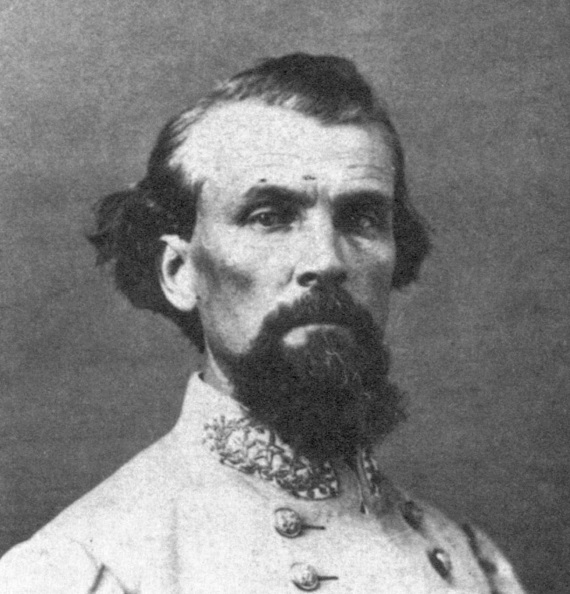One of the greatest men in American history was born on this date (July 13) in 1821 near the town of Chapel Hill, Tennessee, then known as Bledsoe’s Lick.
It is said that a few years after the great American war of 1861—1865 an Englishman asked General R.E. Lee who was the greatest soldier produced by the war. Lee answered readily: “A gentleman in Tennessee whom I have never met. His name is Forrest.”
When he was 17 Nathan Bedford Forrest’s father died leaving him with the responsibility for a family of eleven siblings. By 1861 he was a wealthy merchant, noted for integrity and benevolence, and a Memphis alderman. At the age of 40 he enlisted as a Confederate private but soon formed his own company. Declining to surrender when the fall of Fort Donelson was imminent, Forrest led his own and other troops to freedom in a winter march through swamps. He commanded the rear guard with great courage and skill in the withdrawal after Shiloh. By this time he was evidently a superb soldier and leader of men and commanded a division of cavalry (or more properly, mounted infantry).
Forrest’s explanation for his outstanding military successes in many different situations is often quoted: “I got there first with the most.” Sound military advice. But remember that Forrest never had “the most” of anything. So getting there first with the most could only be accomplished with extraordinary skill, exertion, and risk. General J.E.B. Stuart is rightly celebrated for his ride around the Northern army in Virginia. More than once Forrest rode a great circle around vast forces of enemies in occupied Tennessee and Kentucky and returned with a large booty of horses, provisions and equipment, prisoners, and recruits. Not to mention having destroyed immense quantities of the invading enemy’s supplies and infrastructure. Forrest’s successes against always superior forces are well told in the biographies by John A. Wyeth, Robert S. Henry, Jack Hurst, and Lochlain Seabrook. And in Donald Davidson’s epic poem “The Running of Streight.”
Of course, Forrest’s success rests not only on military skill but also on the courage and dedication of the men who followed him. He was first of all a leader of men. He personally dispatched to hell, it is said, sixteen enemy invaders, was wounded several times, and had numerous mounts killed under him.
Forrest was so successful that General Sherman called him “that devil” and wanted to have him murdered even if it broke the U.S. Treasury. After he had finished his killing and burning, Sherman is quoted as saying that “Forrest was the most remarkable man produced by the Civil War on either side.” It is a plain fact that the labels “devil,” “terrorist,” and “criminal” fit Sherman far better than they fit Forrest. Although Sherman was honest enough to investigate and repudiate the still-repeated lie that Forrest was guilty of war crimes at Fort Pillow.
Sherman sacrificed nothing for his cause. Forrest lost his fortune and his health (died at 56) and his beloved younger brother, but he never regretted anything except that he had not been given a larger role in the Confederacy until too late. We can compare the moral qualities of the two leaders thus: According to Sherman, “War is Hell.” I did not kill and burn out all those civilians. It was this abstract force out there called “war.” According to Forrest: “War means fighting and fighting means killing.” I accept responsibility for my actions.
Forrest of course has been banished from the American pantheon because Americans are determined to prettify their history and suppress the truth, which requires always the demonization of the evil South. Like George Washington and Andrew Jackson, Forrest was as American as can be. Allowing for different circumstances with the passing of a generation or two, Forrest almost exactly resembles Andrew Jackson. Both were born on the Southern frontier in poor circumstances. Both were self-made successes. Both were military nonprofessionals who became great commanders in defense of their people. Both were men of great integrity but who were not to be trifled with.
These days Forrest, for a lot of people, is hard to understand. One of those “historians” who regard everything positive that can be said about the Confederacy as naught but “a Lost Cause Myth,” wonders how anyone could admire such an awful character. The proper question is: how could so epic a hero in defense of his people not be admired? Has this spiritually and culturally impoverished but all too common American scribbler never heard of Hector at Troy, Horatio at the Bridge, Roland at Ronscevalles, or the defenders of the Alamo? It is perhaps relevant here to notice a great-grandson, General Nathan Bedford Forrest, U.S.A., who died in his thirties in 1943 in the air over Germany.







